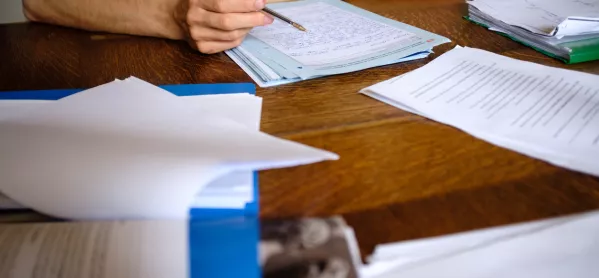GCSEs 2021: Teachers’ marking burden not ‘much greater’

Ofqual has defended its proposals for externally set tasks marked by teachers for GCSEs and A levels this summer.
In an interview with Tes, interim chief regulator Simon Lebus said the arrangements could make it easier for teachers to assess students’ grades and would not make their marking burden “much greater”.
He made his comments after teachers were angered by suggestions that they would need to mark external tasks set by exam boards as part of the grading for GCSE and A-level students this year.
They are arguing that it is an extra burden in an already tough year and a job that exam boards usually pay teachers for.
GCSEs 2021: Teachers to mark exam board questions
Exams 2021: Teachers don’t want to mark external tests
News: Teacher workload a ‘concern’, says Ofqual
No algorithm: Teacher judgements won’t be second-guessed
But Mr Lebus told Tes that the marking of external tasks would not create a much “greater” workload in terms of marking, although he has acknowledged that respondents to Ofqual’s consultation have raised concerns over teacher workload overall.
GCSEs 2021: External tasks ‘will help teachers with any appeals’
“Obviously exam boards have a lot of past question papers and they can snip those up and divide them into individual questions or parts of papers, so I don’t think in terms of extra marking burden it would be that much greater than the burden associated with coursework normally or with extra homework or mock exams,” he said.
“And I think the other great benefit is it is probably helpful for teachers because if they find, as part of the appeals, that students are challenging the grading judgements, they will be able to point to some of these externally set tasks and the sort of mark schemes and measures for establishing consistency that exam boards have applied and say, ‘Look there is a rationale for having reached these conclusions.’”
Mr Lebus added: ”I think, inevitably, people are going to have more trust in quality assurance arrangements that provide plausible mechanisms for external review and scrutiny than they would without that, so my sense is it will make teachers and schools’ lives slightly easier because they will be able to rely on the anchoring and benchmarks of external assessments provided as an additional source of evidence to back their judgements.”
Asked what his advice was for teachers, Mr Lebus added: “I think, at the end of the day, students have got to feel they’ve been fairly dealt with and teachers have got to feel they’re operating a manageable system, so the principle of fairness is fundamental, and fundamental to achieving that sense of fairness is a robust set of quality assurance arrangements.”
And asked what he would say to teachers asking why they needed to mark external assessments, Mr Lebus said: “The principle behind using external assessments as one of the sources of evidence that teachers use to inform their grading judgement is that it does provide a degree of consistency so that coming back to my proposition that somebody from Brighton or somebody from Burnley should be held to the same standard.”
“It provides a benchmark to try and ensure that that is fair, it’s a way of anchoring judgements and providing a sort of consistent framework to see people are being held to the same standard whichever school or college they are in/ So I think it’s quite a positive thing.
Mr Lebus said the consultation, which closes on 29 January, had had 65,000 responses so far.
Register with Tes and you can read two free articles every month plus you'll have access to our range of award-winning newsletters.
Keep reading with our special offer!
You’ve reached your limit of free articles this month.
- Unlimited access to all Tes magazine content
- Save your favourite articles and gift them to your colleagues
- Exclusive subscriber-only stories
- Over 200,000 archived articles
- Unlimited access to all Tes magazine content
- Save your favourite articles and gift them to your colleagues
- Exclusive subscriber-only stories
- Over 200,000 archived articles